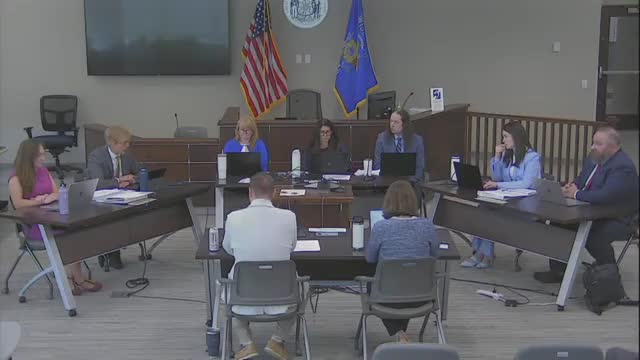Commissioners approve PEARS project ensuring adequate electric supply and reliability
May 24, 2025 | Public Service Commission, State Agencies, Executive, Wisconsin
This article was created by AI summarizing key points discussed. AI makes mistakes, so for full details and context, please refer to the video of the full meeting. Please report any errors so we can fix them. Report an error »

The Public Service Commission of Wisconsin convened on May 22, 2025, to discuss the proposed Paris Scribe project, a significant energy initiative aimed at enhancing the state's electric supply. The meeting highlighted a robust debate among commissioners regarding the project's necessity and its implications for future energy reliability.
Commissioner concerns were raised about the applicant's claims regarding the project's ability to integrate renewable energy sources like solar and wind. One commissioner emphasized that the applicant's assertion was misleading, stating, "I thought it was totally inappropriate... we have bigger problems on our hands." This pointed critique underscored the importance of transparency in the project's evaluation process.
The commissioners ultimately leaned towards supporting the project, with multiple members expressing confidence that it would meet the public's energy needs. They noted that extensive modeling and analysis demonstrated the project's viability, with one commissioner stating, "The record sufficiently demonstrates an expected capacity need." This sentiment was echoed by others, who agreed that the project aligns with Wisconsin's energy priorities and is cost-effective.
In addressing alternative energy sources, the commission found no viable options that could replace the Paris Scribe project without compromising reliability or increasing costs. "No EPL alternatives exist that are cost-effective, technically feasible, and environmentally sound," one commissioner concluded, reinforcing the project's necessity.
The meeting also touched on the project's potential to enhance efficiency in energy delivery. Commissioners expressed optimism about the project's ability to utilize existing infrastructure effectively, with one remarking on the "surplus interconnection process" being maximized for the first time.
As the commission moves forward, the Paris Scribe project stands as a pivotal development in Wisconsin's energy landscape, promising to bolster the state's electric supply while navigating the complexities of integrating renewable resources. The anticipated outcomes from this initiative could reshape the future of energy in Wisconsin, ensuring reliability and sustainability for years to come.
Commissioner concerns were raised about the applicant's claims regarding the project's ability to integrate renewable energy sources like solar and wind. One commissioner emphasized that the applicant's assertion was misleading, stating, "I thought it was totally inappropriate... we have bigger problems on our hands." This pointed critique underscored the importance of transparency in the project's evaluation process.
The commissioners ultimately leaned towards supporting the project, with multiple members expressing confidence that it would meet the public's energy needs. They noted that extensive modeling and analysis demonstrated the project's viability, with one commissioner stating, "The record sufficiently demonstrates an expected capacity need." This sentiment was echoed by others, who agreed that the project aligns with Wisconsin's energy priorities and is cost-effective.
In addressing alternative energy sources, the commission found no viable options that could replace the Paris Scribe project without compromising reliability or increasing costs. "No EPL alternatives exist that are cost-effective, technically feasible, and environmentally sound," one commissioner concluded, reinforcing the project's necessity.
The meeting also touched on the project's potential to enhance efficiency in energy delivery. Commissioners expressed optimism about the project's ability to utilize existing infrastructure effectively, with one remarking on the "surplus interconnection process" being maximized for the first time.
As the commission moves forward, the Paris Scribe project stands as a pivotal development in Wisconsin's energy landscape, promising to bolster the state's electric supply while navigating the complexities of integrating renewable resources. The anticipated outcomes from this initiative could reshape the future of energy in Wisconsin, ensuring reliability and sustainability for years to come.
View full meeting
This article is based on a recent meeting—watch the full video and explore the complete transcript for deeper insights into the discussion.
View full meeting
